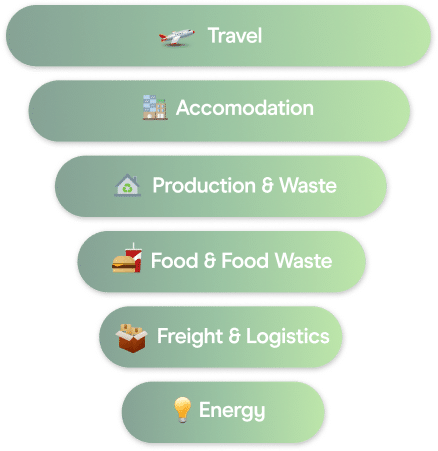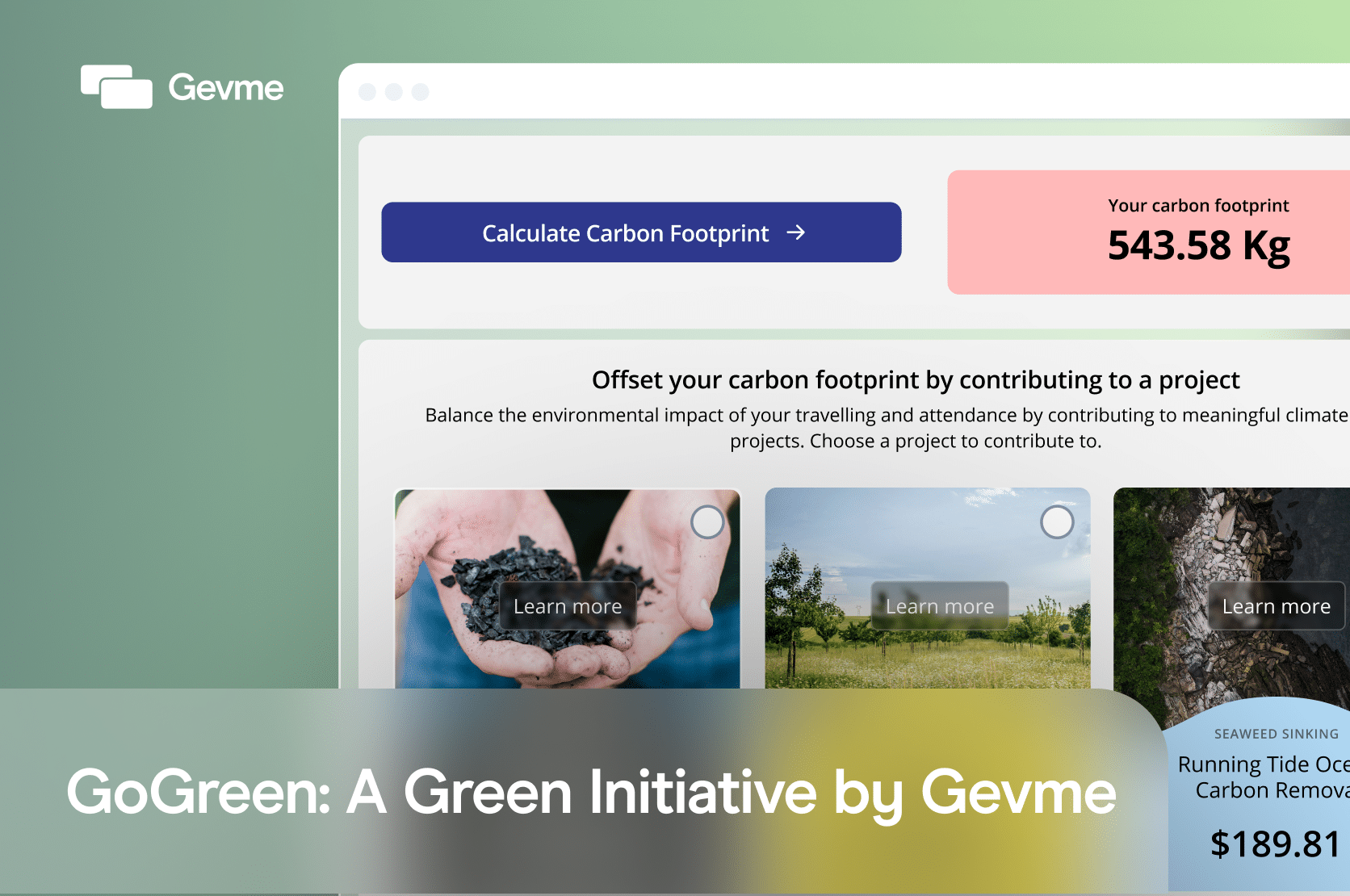Onsite events have long been a cornerstone of human interaction, providing valuable opportunities for networking, knowledge exchange, and fostering meaningful connections. They provide a platform for individuals and organizations to showcase their products, services, and expertise, leading to business growth and economic development. Moreover, onsite events offer unique face-to-face interactions that cannot be fully replicated in virtual settings.
The immersive experience of onsite events creates lasting impressions and memories that contribute to personal and professional growth.
However, with growing environmental concerns it has become crucial to examine the carbon footprint associated with onsite events. This refers to the greenhouse gas emissions generated throughout the event’s lifecycle, including transportation, energy consumption, waste management, and venue operations.
Top Contributors to Carbon Emissions in the Event Industry:

Travel: The transportation of attendees and speakers is a significant contributor to carbon emissions in the event industry. Air travel, particularly for international events, produces substantial greenhouse gas emissions. The distance travelled and the mode of transportation used heavily influence the emissions generated.
Accommodation: Several factors contribute to the carbon footprint from accommodation at events. These may include the type and size of the accommodation facility, its energy efficiency, the duration of attendees’ stay, and the number of guests occupying the rooms. Energy-intensive activities, such as air conditioning, heating, and hot water usage, can significantly impact the carbon emissions associated with accommodation.
Energy Consumption: Energy consumption during events, including electricity for lighting, heating, cooling, and audiovisual equipment, contributes heavily to carbon emissions. Large-scale events require substantial energy to power stages, exhibition halls, and other infrastructure.
Waste Management: The management of waste generated during events has a significant environmental impact. Improper waste disposal practices, excessive use of single-use items, and limited recycling options result in a high amount of carbon emissions. When waste is sent to landfills, it decomposes and produces methane, a potent greenhouse gas.
Printed material and signage: The use of paper and other materials derived from natural resources, combined with energy-intensive printing processes, leads to emissions. Embracing digital alternatives, such as mobile event apps and digital signage, can significantly reduce the environmental impact of printed materials.
Mitigating the environmental impact of events requires a sustainable and comprehensive approach that addresses these top contributors to carbon emissions. Through carbon offsetting, the event industry can play a significant role in reducing its carbon footprint and contributing to a more sustainable future.
At Gevme, we are dedicated to advancing sustainability within the event industry and optimizing event practices. In pursuit of this mission, we are thrilled to unveil our latest innovation—an exceptional feature designed to empower event organizers worldwide. This tool enables organizers to effortlessly identify critical areas of improvement within their events and implement environmentally conscious actions. With this powerful addition, we aim to revolutionize the way events are planned and executed, fostering a greener and more sustainable future for the industry.
Introducing GoGreen
GoGreen, a comprehensive suite of cutting-edge tools developed by Gevme, empowers event organizers with the ability to meticulously measure, calculate, and offset the carbon footprint associated with their events.
Enabling this functionality is a seamless process during the creation of the registration form. Once activated, organizers have the flexibility to choose the specific features they wish to showcase, such as travel, accommodation, and carbon offsetting. When the offsetting feature is enabled, organizers are presented with a diverse array of projects from a comprehensive list, allowing them to select the ones they want their attendees to support.
By carefully selecting the projects, organizers can see the carbon footprint widget on their registration form builder. This user-friendly interface empowers organizers to customize and tailor their event registration process to include the essential elements of travel, accommodation, and offsetting, ensuring a streamlined and eco-conscious experience for attendees.
With this revolutionary offering, Gevme equips organizers with the means to adopt an environmentally responsible approach, aligning their events with sustainable practices and contributing to the global movement towards a greener future.
How does it work?
Step one: Measuring
To effectively mitigate carbon emissions, obtaining comprehensive data on attendees’ travel and accommodation is crucial. Gevme’s advanced registration form empowers event organizers to effortlessly capture this vital information, streamlining the process.
Within the registration form, attendees are provided with the opportunity to specify their chosen mode of transportation, whether it be by flight, car, train, bus, or any other means. For those opting for air travel, attendees can also specify the airport they are travelling from and the type of seat they have booked. Additionally, attendees can provide details regarding their return journey.
If the attendees are going to be staying in a hotel, they can share information about the type of lodging they plan to stay in. By gathering these essential details, event organisers can seamlessly progress to the next step of the process.
Step two: Calculating
Once the essential information regarding attendees’ travel and accommodation has been collected, event organizers can precisely calculate the carbon footprint using Gevme’s carbon calculator. Our calculator is meticulously crafted based on industry standards and relies on trusted data sets to ensure accurate results.
For calculating carbon emissions from flights, we rely on the expertise of the International Civil Aviation Organization (ICAO), a specialized agency of the United Nations. When it comes to assessing the carbon footprint of cars, we employ the trusted data provided by the United States Environmental Protection Agency (EPA). Additionally, for evaluating the carbon impact of hotel accommodations, we refer to the Cornell Hotel Sustainability Benchmarking Index (CHSB).
Within the Gevme Registration platform, event organisers can find a report section that showcases their event’s total carbon footprint derived from attendee travel and accommodation. This data can be easily exported and shared with an auditor, facilitating a comprehensive carbon audit of the event.
With all the essential data at hand, event organisers can proceed to the final step.
Step three: Carbon Offsetting
Once attendees have entered their travel and accommodation information, they are given the opportunity to personally contribute to offsetting their carbon footprint by selecting a project of their choice. This seamless process allows attendees to easily support a specific project directly from their registration form, with the corresponding amount automatically included in the total registration fees.
This empowering feature enables environmentally conscious attendees to actively participate in sustainability efforts while attending your event, aligning their actions with their eco-friendly values and making a positive impact on the environment.
The Impact
By incorporating carbon offsetting features into their events, organizers can actively contribute to the reduction of carbon emissions, leading to a positive environmental impact. This commitment to sustainability not only enhances the event’s brand image but also raises awareness among attendees about the importance of sustainable practices.
Furthermore, by involving attendees in the carbon offsetting process, organizers create a deeper sense of engagement and connection, instilling a shared responsibility for the environment. This fosters a collective effort towards creating more sustainable events and a greater appreciation for the role individuals can play in addressing environmental challenges.
Reach out to us to try GoGreen and reduce your event’s carbon emissions.








